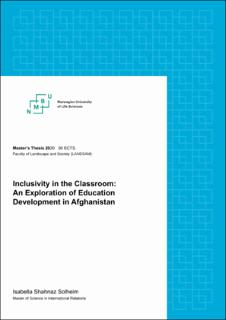| dc.description.abstract | Through the examination of Afghanistan’s fragility and insecurity, discriminations of gender, disabilities and language and the interventions of the international community throughout the last forty years, the research in this thesis attempts to understand the underlying phenomena behind exclusivity in Education systems in Afghanistan. It will aim to answer the main research question of identifying opportunities and challenges in recent educational development for improving the education sector in Afghanistan. The methodology of this qualitative study utilized data from interviews conducted by the Norwegian Afghanistan Committee (which included interviews with children, Shuras, ministry officials and educators) and produced her own interviews with three employees of the NGO. It also explored preceding literature surrounding state & peace building ideals, inclusivity, historical context & International Relations theories. This allowed a well-rounded understanding of the issues and experiences of individuals in the Afghan education sector. By analyzing educational development through a theoretical framework of constructivism, post-structuralism, feminism and globalism the researcher found two significant components. First, internal insecurity in a politically and socially unstable state greatly affects educational institutions and developments. Creating safer learning spaces is paramount to combating the lack of inclusivity in the state’s education sector. Second, effective management and training of education professionals is significant in ameliorating education development. It also allows for such ideals of security and inclusivity to be operationalized through these social institutions at an earlier cognitive stage for children. Similar to other studies, this report found that the goals for most educational development processes are rooted in the Marxist “human capital” approach. It also studies however, Gramsci’s more humanist perspective of the human capital approach by embedding its philosophical paradigm of social cohesion and change. This was evident as the Afghan Ministry of Education aims to develop the education sector in order to promote sustainable “socioeconomic development and social cohesion” in Afghanistan. | en_US |

